A troupe of tippers
Page 23
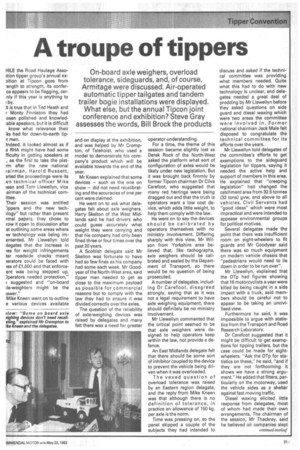
Page 24
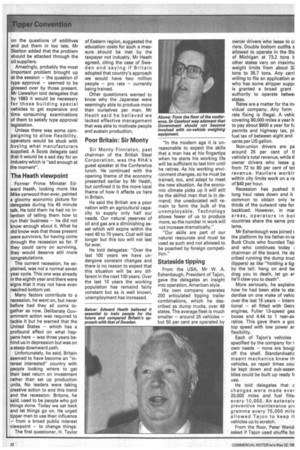
Page 25
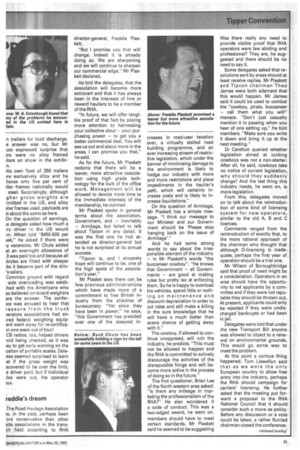
Page 26
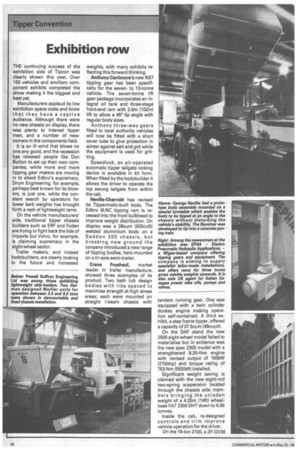
Page 27
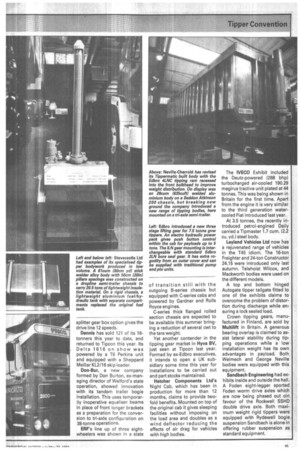
If you've noticed an error in this article please click here to report it so we can fix it.
On-board axle weighers, overload tolerance, sideguards, and, of course, Armitage were discussed. Air-operated automatic tipper tailgates and tandem trailer bogie installations were displayed. What else, but the annual Tipcon joint conference and exhibition? Steve Gray assesses the words, Bill Brock the products
HILE the Road Haulage AssoWon tipper group's annual exbition at Tipcon goes from .ength to strength, its conferice appears to be flagging, cerinly if this year is anything to by.
It is true that in Ted Heath and r Monty Finniston they had osen polished and knowledtable speakers, but it is difficult know what relevance their lks had for down-to-earth tip:r men.
Indeed, it looked almost as if e RHA might have had some fficulty in getting speakers at I, as the first to take the platrm after the new national lairman, Harold Russett, arted the proceedings were its Nn technical officer Mike leen and Tom Llewellyn, vice 'airman of the technical cornittee.
Their session was entitled "ippers and the new tech)logy" but rather than present rmal paOers, they chose to row it open to discussion after st outlining some areas where aN technology was being imemented. Mr Llewellyn told :legates that the increase in les for weight infringements ter roadside checks meant )erators could be faced with les of 0,000 and that enforceent was being stepped up. )perators needed protection," 3 suggested and "on-board cle-weighters might be the iswer."
Mike Kneen went on to outline e various devices available and on display at the exhibition, and was helped by Mr Crompton, of Telehoist, who used a model to demonstrate his company's product which will be available towards the end of the year.
Mr Kneen explained that some devices — such as the one on show — did not need recalibrating and the accuracies of one per cent were claimed.
He went on to ask what delegates felt about axle weighers. Harry Skelton of the West Midlands said he had drivers who could guess accurately what weight they were carrying and that his company had only been fined three or four times over the past 20 years.
A Scottish delegate said Mr Skelton was fortunate to have had so few fines as his company had some each week. Mr Goodyear of the North-West area, said tipper men needed to get as close to the maximum payload as possible for commercial reasons but to comply with the law they had to ensure it was divided correctly over the axles.
The question of the reliability of axle-weighing devices was raised by delegates and many felt there was a need for greater operator understanding.
For a time, the theme of this session became slightly lost as Derek Rook of the North-West asked the platform what sort of configuration of axles would be likely under new legislation. But it was brought back firnmly by former Tipcon chairman Dr Clive Carefoot, who suggested that many red herrings were being dragged out and that the truth is operators want a low cost device, which adds little weight, to help them comply with the law.
He went on to say the devices should be calibrated by operators themselves with no ministry involvement. Differing sharply with this view, Mr Wilson from Yorkshire area believed that, like tachographs, axle weighers should be calibrated and sealed by the Department of Transport, so there would be no question of being prosecuted.
A number of delegates, including Dr Carefoot, disagreed strongly, saying that as it was not a legal requirement to have axle weighing equipment, there should definitely be no ministry involvement.
Mr Llewellyn commented that the critical point seemed to be that axle weighers were designed to help operators keep within the law, not provide a defence.
An East Midlands delegate felt that there should be some sort of inhibitor coupled to the device to prevent the vehicle being driven when it was overloaded.
The vexed question of overload tolerance was raised by an Eastern region delegate, and the reply from Mike Kneen was that although there is no definition of tolerance, in practice an allowance of 150 kg. per axle is the norm.
Time was pressing on, so the panel skipped a couple of the subjects they had intended to discuss and asked if the technical committee was providing what members needed. Quite what this had to do with new technology is unclear, and delegates needed a great deal of prodding by Mr Llewellyn before they asked questions on side guard and diesel waxing which were two areas the committee were involved in. Former national chairman Jack Male felt disposed to congratulate the technical committee for its efforts over the years.
Mr Llewellyn told delegates of the committee's efforts to get exemptions to the sideguard legislation for tippers, saying it needed the active help and support of members in this area. He explained that "creeping legislation" had changed the catchment area from 32.5 tonnes (32 tons) gvw, and above to all vehicles. Civil Servants had "good ideas" which were most impractical and were intended to appease environmental groups for political motives.
Several delegates made the point that there was insufficient room on eight-wheelers to fit guards and Mr Goodyear said there was so much equipment on modern vehicle chassis that "pedestrians would need to lie down in order to be run over".
Mr Llewellyn, explained that the DTp had figures showing that 16 motorcyclists a year were killed by being caught in a side impact with a truck, said members should be careful not to appear to be taking an uncivilised view.
Furthermore he said, it was impossible to argue with statistics from the Transport and Road Research Laboratory.
Dr Carefoot suggested that it might be difficult to get exemptions for tipping trailers, but the case could be made for eightwheelers. "Ask the DTp for statistics on these," he said, "and if they are not forthcoming it shows we have a strong argument." He added that fitters, particularly on the motorway, used the vehicle sides as a shelter against fast moving traffic.
Diesel waxing elicited little response from delegates, most of whom had made their own arrangements. The chairman of the session, Mr Thackray, said he believed oil companies slept on the questions of additives and put them in too late. Mr Skelton added that the problem should be attacked through the oil suppliers.
Amazingly, probably the most important problem brought up at the session — the question of type approval — seemed to be glossed over by those present. Mr Llewellyn told delegates that by 1983 it would be necessary for those building special vehicles to get expensive and time consuming examinations of them to satisfy type approval legislation.
Unless there was some campaigning to allow flexibility, operators would be stuck with buying what manufacturers supplied. A Scots delegate said that it would be a sad day for an industry which is "sad enough at the moment".
The Heath viewpoint
Former Prime Minister Edward Heath, looking more like Mike yarwood than ever, painted a gloomy economic picture for delegates during his 45 minute talk. He told them he had no intention of telling them how to run their business — he did not know enough about it. What he did know was that those present were survivors, for having come through the recession so far. If they could carry on surviving, they would deserve still more congratulations.
The current recession, he explained, was not a normal seven year cycle. This one was already in the eighth year and there were signs that it may not have even reached bottom yet.
Many factors contribute to a recession, he went on, but never before had they all come togather as now. Deliberate Government action was required to tackle it but he warned that the United States — which has a profound effect on what happens here — was three years behind us in depression but was on a steep downward path.
Unfortunately, he said, Britain seemed to have become an "interest interested" country with people looking where to get their best return on investment rather than set up production units. No leaders were taking creative action to end this trend and the recession. Britons, he said, used to be people who got things done. Today we sat back and let things go on. He urged tipper men to use their influence — from a broad public interest viewpoint — to change things.
The first questioner, H. Taylor of Eastern region, suggested the education costs for such a measure should be met by the taxpayer not industry. Mr Heath agreed, citing the case of Sweden and saying if Britain adopted that country's approach we would have two million people — pro rata — currently being trained.
Other questioners wanted to know why the Japanese were seemingly able to produce more than ourselves per man. Mr Heath said he believed we lacked effective management that was able to motivate people and sustain production.
Poor Britain: Sir Monty
Sir Monty Finniston, past chairman of the British Steel Corporation, was the RHA's guest speaker at the Conference lunch. He continued with the opening theme of the economy presented earlier by Mr Heath, but confined it to the more local theme of how it affects us here in Britain.
He said the British are !a poor nation with an agricultural capacity to supply only half our needs. Our natural reserve& of oil and gas are a diminishing asset which will expire within the next 40 to 70 years. Coal will last longer but this too will not last for ever.
He told delegates: "Over the last 100 years we have undergone constant changes and there is no reason to expect that this situation will be any different in the next 100 years. Over the last 10 years the working population has remaind fairly constant but as is well known, unemployment has increased. "In the modern age it is unreasonable to expect the skills that a man has at his fingertips when he starts his working life will be sufficient to last him until he retires. As his working environment changes, so he must be trained, too, and adapt to meet the new situation. As the economic climate picks up it will still be the skilled man that is in demand; the uneducated will remain to form the bulk of the unemployable. Technology allows fewer of us to produce more, so the number in work will not increase dramatically."
"Our skills are part of our natural resources and must be used as such and not allowed to be poached by foreign competition."
Stateside tipping
From the USA, Mr W. A. Eshenbaugh, President of Tajon, gave the delegates an insight into operation, American style.
His own company operates 200 articulated tipping trailer combinations, which he described as dump trucks, over 48 states. The average fleet is much smaller — around 25 vehicles — but 50 per cent are operated by owner drivers who lease to a riers. Double bottom outfits a allowed to operate in the Sta of Michigan at 73.2 tons h other states vary on rnaximu weight limits from about X tons to 35.7 tons. Any carri willing to file an application al who has some shipper suppc is granted a broad grant authority to operate betwe states.
Rates are a matter for the in vidual company. Any form rate fixing is illegal. A vehic covering 80,000 miles a year h to pay about $800 a year for fu permits and highway tax, oil fuel tax of between eight and cents per US gallon.
Non-union drivers are pa around 25 per cent of tl vehicle's total revenue, while ti owner drivers who lease g from 72 to 80 per cent of tel revenue. Hauliers workir within city limits work on a ra of $40 per hour.
Recession has pushed tl long haul rates down and it common to obtain only tv thirds of the outward rate for backload. However, in mar areas, operators in boi countries share the same pro lems.
Mr Eshenbough was joined c the platform by his father-in-la Buck Chuts who founded Tajc and who continues today chairman of the board. He de cribed running the dump truci (tippers) as like "holding a tig by the tail: hang on and he drag you to death, let go ar he'll claw you to death".
More seriously, he explainE how he had been able to sta dardise on one make of vehic over the last 15 years — Intern tional — all fitted with Detre engines, Fuller 13-speed gea boxes and 4.44 to 1 rear-ax ratios. This gave them a goc top speed with low power ar flexibility.
Each of Tajon's vehicles specified by the company for i own needs — none are bougl off the shelf. Standardisatic meant mechanics knew th vehicles, so repair times coul be kept down and sub-assen blies could be built up ready fr use.
He told delegates that e changes were made ever 20,000 miles and fuel filtei every 10,000. An extensiv preventive maintenance prr gramme every 75,000 mile allowed Tajon to keep it vehicles up to scratch.
From the floor, Peter Wend asked if Tajon used shuffle bo
r trailers for load discharge. e answer was no, but Mr 'tits expressed surprise that 3re were no alloy framed 'Hers on show in the exhibiin.
His own fleet of 250 trailers re exclusively alloy and he .lieves only five per cent of flier frames nationally would steel. Surprisingly, although gher gross weights are irmitted in the US, and allby iller frames used, payloads are gt about the same as here.
On the question of earnings, le delegate asked how much a rry driver in the US would irn. When told "$450-500 per aek," he asked if there were ly vacancies. Mr Chuts added at an overnight allowance of 3 was paid too and because all ihicles are fitted with sleeper bs it became part of the driv's salary.
Common ground with regard axle overloading was estabihed with the Americans who so believed on-board weighers are the answer. The conferice was amused to hear that ressure from the truck aerators associations had enired federal weighing equipant went away for re-certificaan one week out of four!
CB radios, too, helped drivers void being checked, as it was isy to get early warning on the cation of portable scales. Delettes seemed surprised to learn at if the gross weight was scovered to be over the limit, e driver paid, but if individual des were out, the operator tys. director-general, Freddie Plaskett.
"But I promise you that will change. Indeed it is already doing so. We are sharpening and we will continue to sharpen our commercial edge," Mr Plaskett declared.
He told the delegates, that the association will become more extrovert and that it has always been in the interests of hire or reward hauliers to be a member of the RHA.
"In future, we will offer tangible proof of that fact by paying more attention to harnessing your collective clout — your purchasing power — to get you a better commercial deal. You will see us out and about more in the areas. I can promise you that," he said.
As for the future,. Mr Plaskett reckons that there will be a leaner, more attractive association using high grade technology for the bulk of the office work. Management will be• allowed to devote more time to the immediate interests of the membership, he claimed.
Mr Plaskett spoke in general terms about the association, Government, and — inevitably — Armitage, but failed to talk about Tipcon in any detail. It was the first one he had attended as director-general but he is not surprised at its annual success.
"Tipcon is, and I sincerely hope will continue to be, one of the high spots of the association's year."
Mr Plasket says there can, be few previous administrations which have made more of a commitment to free British industry from the shackles of bureaucracy. "Yet since they have been in power," he says, "this Government has presided over one of the steepest in creases in road-user taxation ever, a virtually stalled road building programme, and an aver increasing stream of restrictive legislation, which under the banner of minimising damage to the environment is likely to hedge our industry with more and more restrictions and place impediments in the haulier's path, which will certainly increase costs and is likely to increase liquidations."
On the question of Armitage, Mr Plaskett has a simple message. "I think our message to our Minister and our Government should be 'Please stop hanging back on the issue of Armitage'."
And he had some strong words to say about the irresponsible element of the industry — in Mr Plaskett's words "the buccaneer cowboy". "He knows that Government — all Governments — are good at making rules but pretty lax at enforcing them. So he is happy to overload his vehicles, spend little or nothing on maintenance and discount depreciation in order to cut rates and still make a killing in the sure knowledge that he will have a much better than evens chance of getting away with it."
The cowboy, if allowed to continue unopposed, will ruin the industry, he predicts. "This must not be allowed to happen and the RHA is committed to actively discourage the activities of the disreputable fringe and will become more active in the process of doing so in the future."
The first questioner, Brian Lee of the North western area asked: "Is there any mileage in marketing the professionalism of the RHA?" He also wondered if a code of conduct. This was a two-edged sword, he went on. members should have to meet certain standards. Mr Plaskett said he seemed to be suggesting Was there really any need to provide visible proof that RHA operators were law abiding and professional? They are, he suggested and there should be no need to say it.
Some delegates asked that resolutions sent by areas should at least receive replies. Mr Plaskett and Tipcon chairman Theo James were both adamant that this would happen. Mr James said it could be used to combat the "cowboy, pirate, buccaneer — call them what you will" menace. "Don't just casually mention it in passing when you hear of one setting up," .he told members. "Make sure you write it down and bring it up at the next meeting."
Dr Carefoot queried whether legislation aimed at curbing cowboys was not a non-starter. After all, he said, cowboys take no notice of current legislation, why should they suddenly change? And the last thing this industry needs, he went on, is more legislation.
From this, delegates moved on to talk about the reintroduction of some kind of licensing system for new operators, similar to the old A, B and C licences.
Comments ranged from the reintroduction of exactly that, to the more rational approach of the chairman who thought that although 0-licensing is inadequate, perhaps the first year of operation should be a trial one.
Mr Wilson of Boroughbridge said that proof of need might be a consideration. Operators in an area should have the opportunity to vet applicants by a committee and if they were not reputable they should be thrown out. At present, applicants could only be rejected if they were undischarged bankrupts or had been in jail.
Delegateswere told that under the new Transport Bill anyone was allowed to object to a renewal on environmental grounds. This would go some way to meet the problem.
At this point a curious thing happened. Tom Llewellyn said that as we were the only European country to allow free entry into the industry, perhaps • the RHA should campaign for carriers' licensing. He further asked that the meeting put forward a proposal to the RHA National Council that it should consider such a move as policy. Before any discussion or a vote could be taken, a rather flurried chairman closed the conference.
Exhibition row
THE continuing success of the exhibition side of Tipcon was clearly shown this year. Over 100 vehicles and ancillary component exhibits completed the show making it the biggest and best yet.
Manufacturers applaud its low exhibition space costs and know that they have a captive audience. Although there were no new chassis on display, there was plenty to interest tipper men, and a number of newcomers in the components field.
It is an ill wind that blows no one any good, and the recession has released people like Don Burton to set up their own companies, while more and more tipping gear makers are moving in to attack Edbro's supremacy. Drum Engineering, for example, perhaps best known for its blowers, is just one, while the constant search by operators for lower kerb weights has brought forth a rash of lightweight rams.
On the vehicle manufacturers' side, traditional tipper chassis builders such as ERF and Foden are trying to fight back the tide of imports but Volvo, for example, is claiming supremacy in the eight-wheel sector.
Trailer makers, and indeed bodybuilders, are clearly looking to the future and increased weights, with many exhibits reflecting this forward thinking.
Anthony Carrimore's new NS7 tipping gear has been specifically for the sevento 13-tonne vehicle. The seven-tonne lift gear package incorporates an integral oil tank and three-stage front-end ram with 2.6m (102in) lift to allow a 45° tip angle with regular body sizes.
Anthony three-way gears fitted to local authority vehicles will now be fitted with a short cover tube to give protection in winter against salt and grit while the equipment is used for gritting.
Speedlock, an air-operated automatic tipper tailgate locking device is available in kit form. When fitted by the bodybuilder it allows the driver to operate the top swung tailgate from within the cab.
Neville-Charrold has revised its Tippermatic-built body. The Edbro 4LNC tipping ram is recessed into the front bulkhead to improve weight distribution. On display was a 28cum (635cuft) welded aluminium body on a Seddon 200 chassis, but breaking new ground the conpany introduced a new range of tipping bodies, here mounted on a tri-axle semi-trailer.
Crane Fruehauf, market leader in trailer manufacture, showed three examples of its product. Two bath tub design bodies with ribs spaced to maximise strength at high stress areas; each were mounted on straight I-beam chassis with tandem running gear. One was equipped with a twin cylinder donkey engine making operation self-contained. A third exhibit, a step frame tipper, offered a capacity of 37. Scum (49cuyd).
On the DAF stand the new 2500 eight-wheel model failed to materialise but in evidence was the new spec 2300 model with a strengthened 8.25-litre engine with revised output of 160kW (215bhp) and torque rating of 753 Nm (555Ibft) installed.
Significant weight saving is claimed with the new eight-rod two-spring suspension located through the chassis side members bringing the unladen weight of a 4.25m (14ft) wheelbase FAT 2300 DHT down to 6.95 tonnes.
Inside the cab, re-designed controls and trim improve vehicle operation for the driver.
On the 16-ton 2100, a ZF-GV36 splitter gear box option gives the drive line 12 speeds.
Dennis has sold 121 of its 16tonners this year to date, and returned to Tipcon this year. Its Delta 1616 on show was powered by a T6 Perkins unit and equipped with a Sheppard MeiIlar KL2/16 skip loader.
Don-Bur, a new company formed by Don Burton, ex-managing director of Welford's state operation, showed innovation with its tandem trailer bogie installation. This uses temporarily inoperative equaliser beams in place of front longer brackets as a preparation for the conversion to tri-axle configuration on 38-tonne operations.
ERF's line up of three eightwheelers was shown in a state of transition still with the outgoing B-series chassis but equipped with C-series cabs and powered by Gardner and Rolls Royce engines.
C-series thick flanged rolled section chassis are expected to be available this summer bringing a reduction of several cwt to the tare weight.
Yet another contender in the tipping gear market in Hyva BV, just seen at Tipcon last year. Formed by ex-Edbro executives, it intends to open a UK subsidiary some time this year for installations to be carried out and part stocks maintained.
Hatcher Components Ltd's Night Cab, which has been in production for more than 12 months, claims to provide twofold benefits. Mounted on top of the original cab it gives sleeping facilities without imposing on the load area and doubles as a wind deflector reducing the effects of air drag for vehicles with high bodies. The IVECO Exhibit included the Deutz-powered (268 bhp) turbocharged air-cooled 190.29 magirus tractive unit plated at 44 tonnes. This was being shown in Britain for the first time. Apart from the engine it is very similar to the third generation watercooled Fiat introduced last year.
At 3.5 tonnes, the recently introduced petrol-engined Daily carried a Tipmaster 1.7 cum. (2.2 cu. yd.) steel body.
Leyland Vehicles Ltd now has a rejuvenated range of vehicles in the T45 idiom. The 16-ton Freighter and 24-ton Constructor 24.15 were introduced only last autumn. Telehoist Wilcox, and Mackworth bodies were used on the different models.
A top and bottom hinged Autogate tipper tailgate fitted to one of the exhibits claims to overcome the problem of distortion during discharge while ensuring a lock sealed load.
Crown tipping gears, manufactured in Finland, are sold by Multilift in Britain. A generous bearing overlap is claimed to assist lateral stability during tipping operations while a low installation weight has its own advantages in payload. Both Welmech and George Neville bodies were equipped with this equipment.
Sand bach Engineering had exhibits inside and outside the hall. A Foden eight-legger sported Foden worm drive axles which are now being phased out oin favour of the Rockwell SSHD double drive axle, Both maximum weight rigid tippers were equipped with Rydewell bogie suspension Sandbach is alone in offering rubber suspension as standard equipment.






























































































